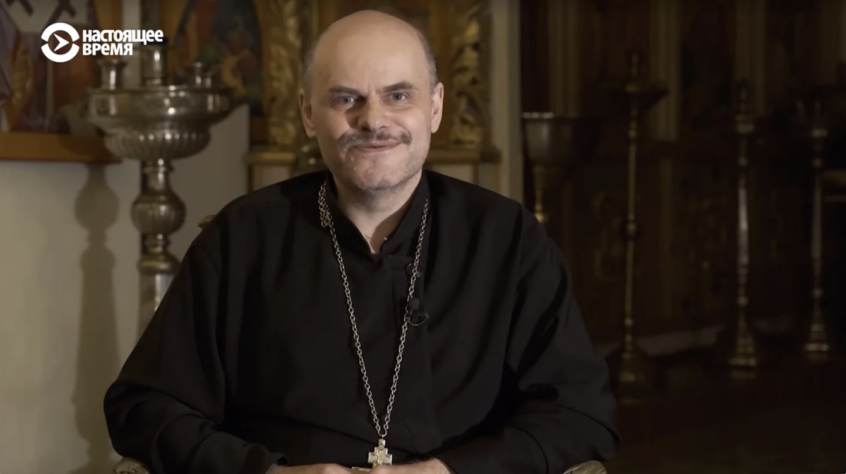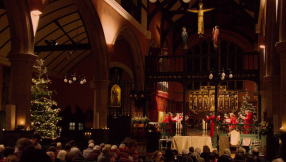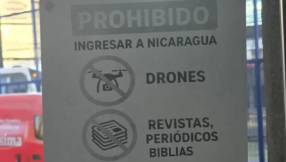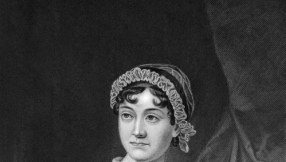
(RNS) The Rev. Ioann Burdin, rector of Resurrection of Christ Orthodox Church in the Russian village of Nikolskoye, offered a simple explanation for why he spoke out last month against his country's invasion of Ukraine.
"I don't consider it possible to remain silent on this situation," he said in an interview, speaking through a translator. "It wasn't about politics," he added. "It was about the Bible. … If I remain silent, I'm not a priest."
It was an unassuming statement with far-reaching implications for a Russian Orthodox priest who made international headlines last month after Russian authorities fined him for his dissent. His actions were a break from the norm: Russian Orthodox leaders typically closely align their ideology, at least in public, with the Kremlin's.
Burdin outlined his reasons for criticizing the war to Lew Nescott Jr., an independent journalist who covers religion and politics. Nescott provided Religion News Service with recordings and transcripts of his interviews with Burdin, some of which were conducted through a translator. Burdin also gave RNS permission to edit his responses for clarity.
Burdin said his first public pushback to Russia's invasion came in an open letter he published online on Feb. 25, shortly after the war began. The priest said the goal of the letter, which he described as "anti-war," was to condemn the invasion of Ukraine as a "real war" and a "Russian invasion" — phrases that depart from Russian President Vladimir Putin's insistence it be described as a "special military operation."
The priest said the letter, which was signed by Burdin and another cleric, insisted "blood is not only a curse to the killers" but "also to those who kept silent" or "didn't protest."
"The duty of all Christians is not to support the power in this ... aggressive war," Burdin said in an interview. "We don't have to repeat mistakes of those Christians who supported the German government when they invaded Poland many years ago," he said in an apparent reference to the beginning of World War II — when Russia also invaded Poland.
The priest said the letter triggered debate online, although his local superior initially respected his right to his own opinion.
Burdin's declarations contrasted with the preaching of Patriarch Kirill of Moscow, the head of the Russian Orthodox Church. Kirill is widely seen as having endorsed the war and laid the spiritual groundwork to justify it, suggesting in a recent homily the invasion is part of a larger "metaphysical" conflict between Russia and Western nations whose agenda is to promote, the prelate said, "gay parades."
Even so, a vocal group of dissenting Russian Orthodox priests in Ukraine and elsewhere have stopped commemorating Kirill's name during their worship services. More than 280 Russian Orthodox priests from different parts of the world — including Burdin, in Russia — also signed on to an open letter in early March calling for "the cessation of the fratricidal war" against Ukraine.
Around the same time, Burdin delivered a short address during a worship service on "Forgiveness Sunday" decrying Russia's actions.
"I told my parishioners that Russians and Ukrainians are two parts of one church," said Burdin, who later noted he was born and educated in the Ukrainian city of Odessa. "For a Russian Orthodox priest like me, it's like civil war."
He then told parishioners he would add to the litany two small prayers about peace in Ukraine and would ask God to protect Ukrainian people.
Roughly two hours later, he got a phone call from one of his parishioners saying the police had been asking congregants about his homily. The police contacted him directly an hour later, demanding he visit the station and provide an explanation.
Burdin explained initial reports that he had been arrested were false. Instead, after the unsettling phone call asking him to report to the authorities, he presented himself at his local police station, where his interlocutors began exerting "moral pressure," he said.
According to Burdin, authorities said: "You have such a wonderful church, but you are betraying your Motherland."
Before the conversation de-escalated, police officers suggested charges against Burdin could be criminal under a new statute passed in March making it illegal to spread "false information" about the Russian military. Breaking the law, particularly for repeat offenders, could result in up to 15 years of jail time.
Burdin said he was later summoned to the office of his local bishop. His superior asked him to "keep silent," he said, and "hinted" the priest could be "banned" from ministry because of his actions.
Meanwhile, Burdin's lawyer warned his phones could be tapped and that he may be followed by a special anti-extremism police unit.
Burdin was fined 35,000 rubles (around $420) in a ruling that accused him of "discrediting the use of the Armed Forces of the Russian Federation," according to Burdin and another person in communication with him. That's slightly more than the fine of 30,000 rubles (around $360) reportedly levied against Russian journalist Marina Ovsyannikova for publishing a video calling on Russians to protest the war. (Ovsyannikova made the video shortly before she staged an anti-war demonstration on live television, an act for which she was arrested and is now facing separate charges.)
Burdin's next steps appear to be in flux. In initial statements made soon after his encounter with police, he said he intended to continue speaking out from his pulpit. However, he later appeared ambivalent about doing so, saying, "If I want to be in jail tomorrow, that's a great option." Around the same time, he said, he began receiving threatening calls from "hidden numbers" branding him a traitor.
Burdin has since shifted his message to social media. In a recent post, Burdin appeared to decry a speech delivered by Putin at a March 18 rally in support of the war. During his address, Putin paraphrased the Bible to laud Russia's troops, saying, "There is no greater love than giving up one's soul for one's friends."
"I don't know what was more — illiteracy or blasphemy — in the speech of the President, who tried with the gospel words 'there is no greater love, as if someone gave his life for his friends' to justify the bloody madness that the whole world has been watching for the second month already," Burdin wrote, according to an automated translation. "What is striking, however, is the approving chorus on the part of the priesthood and some of the laity that followed this performance."
In another post from late March, the priest suggested it was unlikely his words would change much, saying, "The soldier will not lay down his machine gun. The President will not go to a monastery. The Patriarch will not stop preaching about gay parades … "
Yet Burdin framed his actions as a requirement of his Christian faith.
"Your job is not to change, but to testify," he wrote.
Asked by if he was concerned Russian authorities would find and punish him for his posts, Burdin was defiant.
"There is a Russian proverb: 'If you are afraid of wolves, do not go into the forest,'" Burdin said.
When asked again this week, Burdin invoked Psalm 27.
"The Lord is my enlightenment and my Savior — whom shall I fear? The Lord is the defender of my life — whom shall I fear?"













